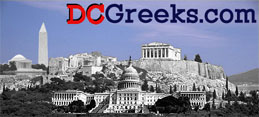What Greek
Independence Day Means to Me
March 25, 2004
If youíve followed site this for the past three years, youíll notice that weíve never had a Greek Independence Day article. We really donít have an
explanation of why thatís been, but I figured Iíd take a shot at it this year. But how relevant is a 183 year old anniversary of the start of a revolution in a country that some of us donít even
visit? Itís not like we really celebrate the 4th of July in this country as anything more than an excuse for fireworks, drinking,
taking a boat out on the Potomac, and the ever-important day off of work. So as a good Greek-American, hereís my take on Greek Independence Day.
Growing up, Greek Independence Day seemed like a lot bigger deal than it does today. There we were, 10 years old, getting ready to go to the annual Greek School ceremony, wearing our foustanelles that we had gotten custom-made, the summer before in Athens. The white button down shirt with the loose sleeves wasnít bad, and the vest was kind of cool, but you added the white tights, the pleated skirt, the shoes with the pom-pom and the wool hat with the huge horse-tail tassel on it, it got to be a little ridiculous, particularly walking out of the house on a Saturday morning and driving to church. We had memorized songs and poems, that we barely understood the meaning of, knowing only that yelling them forcefully like only Greek children can do, made our parentís proud.
Later in life, with Greek School behind us, Greek Independence Day became about the annual trip to the Greek Embassy downtown. If youíve never been to the embassy on Greek Independence Day, it is one huge free-for-all buffet. If this were your only exposure to Greek Independence Day youíd think that was about stuffing your face and trampling your fellow Greeks in a
four-story townhouse in Northwest D.C.
Thereís a more Greek-American commemoration of the holiday that takes place on Capitol Hill every year with a Congressional Salute to Greek Independence Day hosted by Greek-American and Philhellene members. The importance of Philhellenes in the fight for Greek Independence isnít something that you learn about in Greek School. As anti-American and anti-everybody-else as Greeks back in Greece often are, they could stand to remember that other nations supported their independence long ago.
The real public display of the celebration of Greek Independence Day comes in the form of a parade through the streets of Greektown in Baltimore. Every church and local Greek-organization from the area sends representatives to march in the parade. Over the last few years since September 11th, there have been security concerns that have pushed back or even cancelled the parade, but this year appears like it should go off without a hitch.
So what does Greek Independence Day really mean to me as a Greek-American? I couldnít imagine our parents being able to have come to this country without it. Without Greek Independence we really couldnít appreciate the choice that most of our ancestors made and we continue to make in being Greek-Americans. We choose to be Greek-Americans, instead being just Greeks, and itís that choice that is truly liberating for most of us who were born here and plan on staying here, and for those out there who have come here from Greece looking
for a different life.
Read
past feature articles



